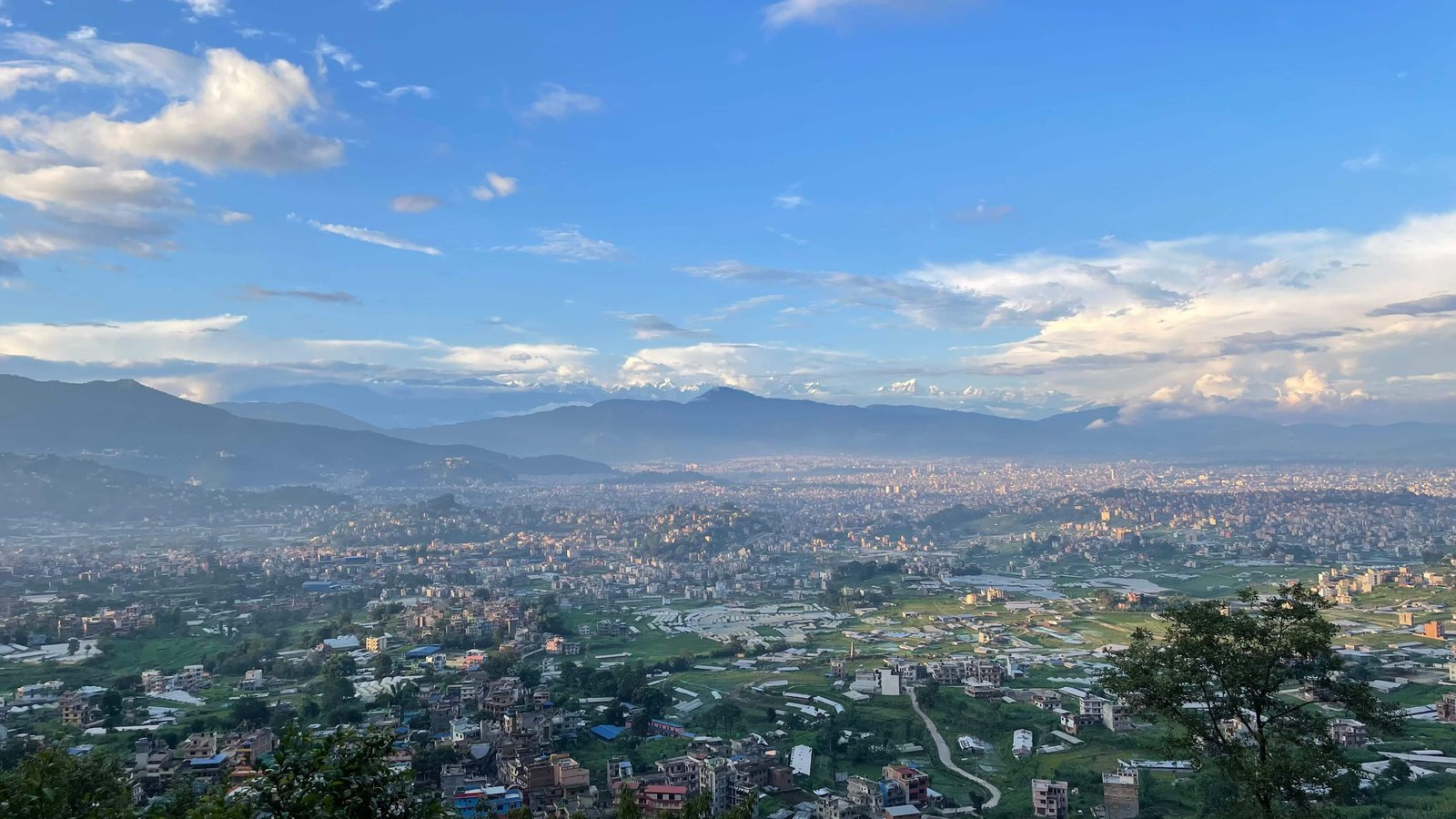Or, When it Rains . . .
[Editor’s note: Oren Karp is a recent graduate of Brown University and a Fulbright Scholar teaching English in Kathmandu, Nepal. He posts an account of his life in Nepal every few weeks.]
One of my favorite things about learning a new language is seeing how the vocabulary, structures, and grammar reflect the lives and culture of the people who speak it. I recently learned a Nepali construction which is meant to convey something which one has just realized: rahechha (रहेछ). There is no direct English translation, but it’s the equivalent of something along the lines of, “I didn’t know that…” or “I’m surprised that…” or “I just realized that…” For example, when I had to move my Nepali class because I found out there was a party after school, I texted my teacher “I can’t come to class, today there is a party rahechha,” the implication being that I hadn’t known until right then. Rahechha is a reflection of living in the moment—you can’t use it in the past. You can realize that something has already happened, but the realizing has to happen in the moment. After that moment has passed, it isn’t rahechha, it just is.
I’m beginning to learn that a week here is not exactly six days of school, but rather six opportunities for a day off from school. On the Sunday after vacation two weeks ago, my first day back, I was walking down to my school when I saw all my students in a line, walking away from school. That was my first hint that something was off. “Hello Sir!” they waved, “good morning Sir!” Then I arrived and found all the teachers talking in the yard, and they told me that we’d have Sunday and Monday off because the construction was still not finished. I started to suspect that I might not have to be too worried about a six-day week. On Friday of last week, the government declared that Sunday would be a public holiday for Eid. They sure don’t give much of a heads up—sometimes I have to actually go to school to find out there’s no school—but it seems like the six-day week is really just a way to guarantee that there will be five days of school at some point, between all the days off.
Days off aren’t the only thing that I find out about last minute. At school this past Monday, I was asked by several teachers if I was going to Sunita’s bhoj after school. Bhoj is usually translated as “feast,” but in reality it can mean anything from a big dinner to a party with hundreds of people. In this case it was the latter, tons of food and dancing and photoshoots in a big hall decked out with balloons and odd wall decorations. I hadn’t known about it, but I said sure, of course. Then I was asked, are you going like that? So I took the hint and changed after school. The teachers met back at school at 4:00, and a reserved bus came to pick us up and drive us out to the party palace where the event was happening. Please note: “party palace” here is not a specific enterprise, I have learned, but rather the official name of a type of establishment, like “restaurant” or “hotel.” Back home one might call it an “event space” or “venue,” but I have to admit that party palace has a great ring to it.
I’ll level with you. I have no idea why the bhoj was happening. Someone probably told me at some point (though it’s not a guarantee), but clearly it didn’t get through. This has not been an uncommon experience at all for me here, having absolutely no reasons for what’s happening around me, and luckily I’m usually happy to just go with the flow. As far as I could tell it was something to do with one of her daughters—my guess would be a Bahra, which is a Newari tradition for girls between 7 and 13 lasting twelve days in which they ceremonially marry the sun. You can think of it as kind of like a Newari Bat Mitzvah: there’s a party, and a young girl, and that’s about where the similarities end. Anyway, I went back to the snack buffet for a second plate of mustang aloo (fried potatoes with Szechuan peppercorn and scallions), mushroom chhoila (a spicy, garlicky Newari dish that’s become one of my favorites), and badam sadheko (a sort of salad with roasted peanuts, cilantro, and raw ginger). And I didn’t think too hard about it.
As far as teaching goes (that’s right—my job!), my frustrations have shifted and found a new target: the textbooks. Classes here have to be taught to the textbooks, and, in short, they’re terrible. They’re everything a textbook shouldn’t be. The chapters are divided into completely disconnected sections which teach grammar and vocabulary seemingly arbitrarily, with no continuity or repeated practice. Just read the examples, fill in the blanks, and boom! Now you know your pronouns.
Each chapter has a text for reading, followed by comprehension questions, and then a bunch of activities that have nothing to do with the reading at all. Students might learn that you can add “-ed” to most verbs to make them past tense, but the story they just read didn’t use the past tense at all. Or they might learn the noun form of some adjectives, but the words weren’t in the story and don’t even follow a pattern: windy — wind, happy — happiness, construct — construction. (You might be thinking to yourself, “that last one isn’t even an adjective.” To which I would respond, “exactly!”)
The textbooks have to be completed—even though there is no concept of progressive lessons to prepare students for future lessons—so the focus shifts from actually understanding anything to just making sure students get the right answers. Even questions that could have multiple correct answers get narrowed down to a single answer which is determined to be “the correct answer” by the teacher. In class, students often try to get me personally to correct their homework, because I look for understanding over “the correct answer,” and I’m willing to mark answers as correct if I feel they show comprehension of the question and material.
I’ve sat through several classes where the teacher reads a text line by line, explaining each sentence in Nepali, and then afterwards writes the answers to the comprehension questions on the board. But there’s a catch! The students can’t write the answers down. That way, when we check their homework tomorrow, we’ll be able to see if they remembered them or not.
Unfortunately, this seemingly airtight pedagogy has a few flaws. Copying of answers is rampant. (To be fair, they’re basically copying the teacher half the time anyway. What’s the difference if they copy another student?) If one student gets it right, everyone sitting around them will probably get it right also, and the teacher doesn’t seem to care as long as “the correct answer” is written. If I see a wrong answer in one student’s homework, I’ll almost always see the same wrong answer in someone else’s homework. Once, over half of fourth grade had the same nonsense sentence written on their homework.
When I directly ask students questions from the book (or, god forbid, my own questions), it’s pretty clear that there is very little actual English comprehension happening for most of them. Sometimes they don’t understand the question itself, or I ask them to read their answer back to me and they can’t even read it—they just wrote the words down without knowing what they mean or how to pronounce them. The real kicker is: it doesn’t matter to them. Come test time, as long as they can spit out the same answers, they’ll pass.
On top of all this, there are often spelling and grammar mistakes in the textbooks, and occasionally the questions don’t even make sense. There’s no teacher’s guide with the answers, so when this happens, teachers and students look to me, and sometimes I have to admit I have no idea what the correct answer is. Before a reading in one chapter for grade 5 it showed a picture of a crane and a crab by a lake with some fish, and had the question, “why were the fish happy?” Even being a native English speaker isn’t going to help me crack that one.
It’s worth mentioning as well that the expected reading level is ridiculous, miles above what even the best readers in my class can accomplish. Why is class 6 reading two pages about T.S. Eliot with vocab words like “preparatory,” “hernia,” and “inclination,” when most of my students couldn’t conjugate verbs in the present tense? I’m honestly not sure if I would’ve been able to read what they’re reading when I was in 6th grade. (For those who are curious, I actually found a PDF of the Nepali grade 6 English textbook online, so you can actually take a look at the exact book I’m teaching from.)
The result, unfortunately, is that many students have simply given up. And I don’t blame them—the assignments are so difficult that for many of them, it really does feel like there is no point. When I’m in class, students are always calling me over, asking me to teach them: but they don’t want me to explain or translate. They only want the answers. The textbook plows ahead either way, not knowing or caring whether the kids are learning anything substantial, not leaving space for anybody to catch up. In its wake students are left struggling, feeling like they don’t want to learn, and what’s maybe even worse, feeling inadequate, like it’s their fault that they don’t understand.
This past Wednesday was Guru Purnima, or Teacher’s Day, which was celebrated with—get this—a day of school! Sure, it was a half-day, but at my school that means class until 2:00 instead of 4:00. I’ll take what I can get, trust me, but whichever teacher chose to call it a “half-day” clearly wasn’t a math teacher. If you ask me, the best way to celebrate teachers would be to give them a break, but I guess someone else thought otherwise. I appreciate the sentiment, really, but we don’t make our moms cook breakfast in bed for us on Mother’s Day, do we? Let me just state right now, officially and for the record, if there is ever a holiday in my name: give people the day off! I’m talking everybody! Trust me, it’s what I would have wanted (for myself, mostly, but consider it my gift to everyone). And don’t even think about a half-day.
Luckily, the kids—and the teachers, for that matter—weren’t really in the mood for school on Teacher’s Day, so classes went quickly. It made me really happy to see all the students so excited: the classes from grade 4 up had taken it upon themselves to decorate their rooms with balloons and flowers, and individual students were giving out tons of chocolates and red pens to teachers as gifts. After classes ended, everyone called the teachers upstairs to the grade 6 classroom, where there was a cake the students had bought for us. Then we pulled chairs out into the yard for the teachers to sit and watch a program organized by the students, including many very cute songs and dances by students of all grades, from 1st through 7th. Most of all I loved the positive energy at school that day, the smiles as all students, shy and eager, came to wish me a happy Teacher’s Day.
The monsoon weather during this season makes a lot of activities tough: it’s usually boiling hot for most of the day, and then suddenly clouds will appear, and it will pour rain. Luckily, it’s fairly predictable, happening around 4:00 every day: often I can see the clouds when I leave school and I get home just as it’s starting to drizzle. I love watching and listening to the fat drops of rain smack down—the rain feels thicker here, heavier, like it has more force hurdling it down to splatter on the earth. It usually doesn’t last long, but somehow it also doesn’t quite manage to cool things off, and it immediately goes right back to being hot, which is a relief only if you were unlucky enough to get soaked in the downpour. And of course I have been, multiple times. So now I have a stylish new umbrella!
I’m still looking for a way to unlock my free time, to figure out how to get what I want from it. Last week when I went to the swimming pool twice, once with my brother and once with some cousins. I’ve learned that plans don’t happen in the same way here: one minute, you’re sitting in bed reading, the next moment your cousin shows up and asks if you want to go swimming. Before you know it you’re on the back of his motorcycle bouncing down the road to the pool. Except for the clouds, rain, and cold, it was a fun way to get some exercise and social time into my schedule. Besides, shivering next to the pool and sharing momos is a bonding experience even better than swimming together.
Today was, of course, not a day of school, and I found out, of course, last Friday. It was my school’s birthday—we’re two months into the school year, so I’m not sure how that works, but I’m not asking questions—so we had a program instead of school. That actually meant that I had to show up at 7:30 in the morning rather than at 10:00, which in my book is worse than a day of school. It was blazing hot, and we watched people speak and students perform songs and dances that were suspiciously identical to the Teacher’s Day performances, only with higher-budget costume design. Then all the teachers loaded into a bus and drove out to a restaurant for lunch, which I mostly spent slumped in a sweaty daze, watching the vice-principal go fishing in the pond by the restaurant. Another teacher told me that our principal had decided that since we had to get up so early, tomorrow would be a holiday. Of course.
When I first learned rahechha, I thought it was interesting that there was an entire grammatical construction for the concept of realization, and didn’t think I would be using it very often. But then I realized that it makes perfect sense: that’s how so many things are here. From school holidays to plans with friends, I’m finding out about everything right before it happens, sometimes as it happens. I show up to school, but oh, there is no school today rahechha! Take a look back: nearly everything I just wrote about was something I didn’t know would be happening or didn’t know why it was happening. And then I knew! (Well, sometimes I knew. But I can still find out!) There’s always things I don’t know, always things I’m realizing, finding out, learning. In my life in Nepal, sometimes there is no choice but to be in the moment: everything rahechha!
This essay was original published by Oren Karp on his Nepali Dispatch blog and is posted here with permission from Oren Karp.
The picture of the view of the mountains from the Kathmandu valley was provided by Oren Karp.



